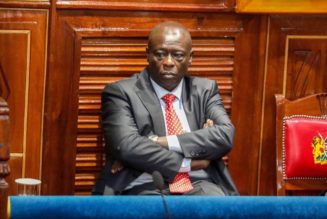Market News
Kenya delays the repayment of Sh80m loans on voucher hitch
Wednesday February 14 2024

The National Treasury building in Nairobi. PHOTO | FILE | NMG
Kenya failed to repay two loans amounting to $0.51 million (Sh79,560,000) by a June 2023 deadline, senior officials disclosed in a letter to the International Monetary Fund (IMF).
Central Bank of Kenya (CBK) Governor Kamau Thugge and Treasury Cabinet Secretary Njuguna Ndung’u blamed the breach on delays in processing payment vouchers.
But in a letter of intent to the IMF boss Kristalina Ivanova Georgieva, Prof Ndung’u and Dr Thugge disclosed Kenya had since made the payments and taken corrective measures against future recurrence.
Read: IMF opens more zero-interest funding to Kenya
“We regret to inform missing on the continuous performance criterion on no new external arrears by a small margin due to delays in processing a payment voucher to settle debt payment,” the two officials said in a joint letter to the IMF boss.
Dr Thugge and Prof Ndung’u did not disclose the issuer of the affected loans.
“We have since then settled these amounts. Additionally, we can assure you and the IMF executive board that necessary corrective actions have been taken to avoid a recurrence of similar misses in the future,” the duo added.
Most debt obligations have specified repayment dates for interest and principal, which if unpaid, could set off alarm bells in the international system.
Kenya takes pride in having never defaulted on any of its debt obligations, though it has restructured or asked for forgiveness of some of its loans, which some experts say amounts to a technical default.
Three African countries—Ethiopia, Ghana, and Zambia—have since defaulted, pointing to the problem of high indebtedness that most frontier markets such as Kenya are grappling with.
Although Kenya has not officially defaulted, its risk of default is high, according to a debt sustainability test done jointly by the IMF and the World Bank.
The country’s high-risk debt distress has been due to the underperformance in export earnings, which means it is not earning sufficient foreign currencies to comfortably settle external loans, most of which are in dollars.
Kenyan authorities said corrective measures have since been put in place to prevent the recurrence of similar administrative delays.
“Such corrective actions include end-of-day reconciliation of payment vouchers against actual payments and strengthening compliance on debt reporting by state-owned enterprises. Based on these actions, we request a waiver of nonobservance of this continuous performance criterion,” Prof Ndung’u and Dr Thugge said.
National Treasury Principal Secretary Dr Chris Kiptoo had by press time not responded to our query on which loans the country had breached.
Treasury officials said the arrears were cleared by November 6 last year and to avoid the recurrence of external arrears in the future, they had since implemented the end-of-day reconciliation of payments vouchers against actual remittances of debt service payments.
“In addition, we will strengthen compliance on debt reporting by (State-Owned Enterprises) SOEs to avoid future lapses in settlement of debt service payments.”
High external debt service costs, which include the repayment of the $2 billion Eurobond, have soaked up the country’s dollar reserves even as the government has redirected funds meant for other critical public services to loan payment.
A weak shilling has exacerbated the country’s debt vulnerabilities with interest payments on loans tapped by the State set to rise by a record Sh231.6 billion, even as a weak shilling forces the Treasury to inflate the size of the budget.
Read: IMF to wire Sh58.8 billion loan to Kenya
The Treasury expects interest payments in the financial year ending June 2024 to rise sharply to Sh918.9 billion—marking an increase of 33.7 percent from Sh687.3 billion, mainly due to the weakening of the shilling.









